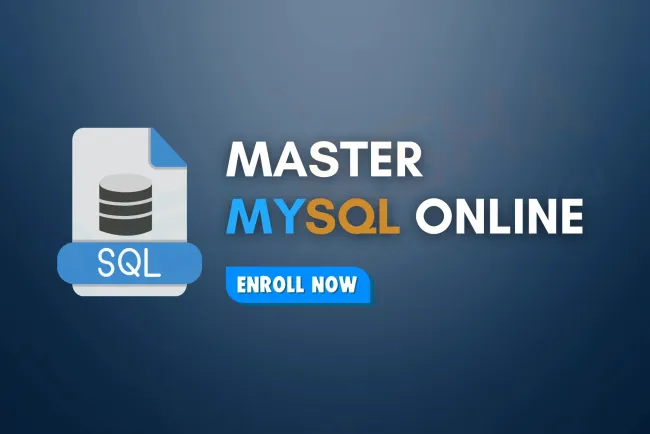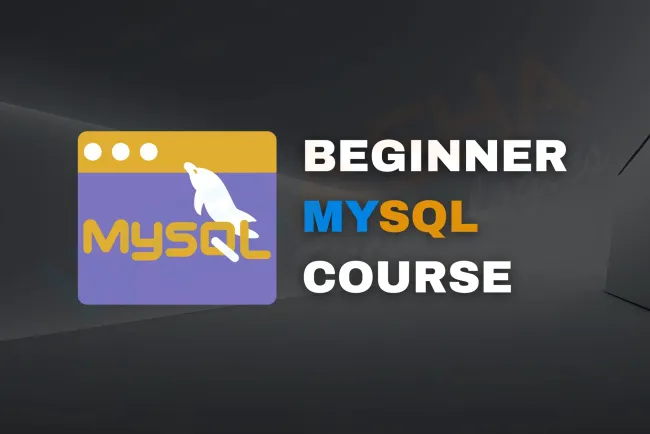MySQL Complete Course | Learn SQL for Data Analysts, Developers & Engineers in Pune
Master MySQL with our comprehensive course designed for beginners and intermediate learners. Gain hands-on experience in SQL, database management, and advanced topics such as indexing, transactions, and optimization. Enroll today and unlock career opportunities in data analytics, backend development, and more!

Table of Contents
- What Is the MySQL Complete Course?
- Course Overview Table
- Why Learn MySQL in 2025?
- What Will You Learn in a MySQL Complete Course?
- Who Should Take the MySQL Complete Course?
- Real-world Applications of MySQL Skills
- Career Opportunities After the Course
- Certification and Job Assistance
- Why Choose WebAsha for MySQL Training?
- Tips to Succeed in a MySQL Course
- Conclusion
- Frequently Asked Questions (FAQs)
MySQL continues to be the cornerstone of structured database management in today’s digital world. Whether you’re aspiring to become a backend developer, data analyst, or full-stack engineer, learning MySQL is a foundational step. In this blog, we’ll explore what the MySQL Complete Course offers, why it matters, who it’s for, and what real-world skills you'll gain. This guide is crafted for learners in Pune and beyond who are ready to master SQL for real-world success.
What Is the MySQL Complete Course?
The MySQL Complete Course is a structured, in-depth training program designed to help students learn Structured Query Language (SQL) and manage databases using MySQL, an open-source RDBMS. The course covers everything from database fundamentals to advanced query optimization, making it ideal for complete beginners and intermediate developers.
Course Overview Table
| Topic | Details |
|---|---|
| Course Name | MySQL Complete Course |
| Suitable For | Beginners, Developers, Data Analysts, Engineering Students |
| Duration | 6 to 8 Weeks |
| Learning Mode | Online + Offline (Live Interactive Classes) |
| Key Modules | SQL Basics, Joins, Functions, Indexing, Views, Triggers, Transactions |
| Tools Covered | MySQL CLI, MySQL Workbench, phpMyAdmin |
| Hands-on Projects | Yes – Real-world database applications |
| Certification Provided | Yes – Industry-recognized certificate |
| Job Assistance | Included – Resume help, mock interviews, placement support |
| Demo Class | Free Demo Available |
Why Learn MySQL in 2025?
-
In-demand Skill: SQL is ranked among the top 3 most-used programming skills globally.
-
Universal Usage: Used in applications ranging from e-commerce and banking to mobile apps.
-
Foundation for Data Careers: SQL is a must-have skill for data analysts, engineers, and scientists.
-
Open-source and Free: MySQL is free, easy to install, and has vast community support.
-
Cloud Integration: Most cloud platforms like AWS, Azure, and GCP offer MySQL-compatible databases.
What Will You Learn in a MySQL Complete Course?
The course is broken down into digestible modules that help you build both theoretical knowledge and hands-on skills.
1. Database Fundamentals
-
What is a database?
-
Difference between RDBMS and NoSQL
-
Entities, schema, keys, relationships
2. SQL Basics
-
Creating, reading, updating, and deleting data (CRUD)
-
Data types and constraints
-
SELECT, WHERE, ORDER BY, GROUP BY
3. Joins and Subqueries
-
INNER JOIN, LEFT JOIN, RIGHT JOIN
-
Nested queries and correlated subqueries
4. Advanced SQL
-
Functions (String, Date, Aggregate)
-
Views, Indexes, Stored Procedures
-
Transactions and ACID properties
5. Performance Optimization
-
Indexing strategies
-
Query plan analysis
-
Best practices in large data handling
6. Database Projects
-
Building a student management system
-
Hospital record system
-
E-commerce product database
Who Should Take the MySQL Complete Course?
This course is designed for:
-
Students in BCA, BSc IT, Engineering, MCA
-
Aspiring Data Analysts & Developers
-
Freelancers & Entrepreneurs managing website databases
-
Backend Engineers wanting better database control
-
Anyone switching to tech or preparing for job interviews
Real-world Applications of MySQL Skills
-
Managing user authentication in websites
-
Storing sensor or IoT data
-
Building data dashboards
-
Handling transactions in e-commerce apps
-
Querying customer behavior patterns
Career Opportunities After the Course
After completing the MySQL Complete Course, you can target job roles such as:
-
SQL Developer
-
Database Administrator (DBA)
-
Data Analyst
-
Backend Developer
-
Business Intelligence Intern
Certification and Job Assistance
Upon course completion, students receive a MySQL Certificate that demonstrates their technical ability to design and manage relational databases. WebAsha’s placement cell helps with:
-
Resume building
-
Technical interview prep
-
Placement drives and referrals
Why Choose WebAsha for MySQL Training?
WebAsha is a trusted training provider that offers:
-
Real-time trainers with industry experience
-
Free demo classes
-
Hands-on practicals and capstone projects
-
Both weekday and weekend batches
-
Full placement support
Tips to Succeed in a MySQL Course
-
Practice SQL queries daily using real datasets
-
Use MySQL Workbench for visual design
-
Join GitHub and contribute to open SQL projects
-
Solve Leetcode/Hackerrank SQL problems
-
Work on one database project by the end of each module
Conclusion
A MySQL Complete Course equips you with essential data handling and analysis skills that open up multiple career doors. Whether you’re in college, working in another domain, or switching to IT, mastering MySQL is a strategic move. Enroll in a course like the one at WebAsha to gain job-ready skills, certification, and career guidance – all under expert mentorship.
FAQs
What is the MySQL Complete Course?
The MySQL Complete Course is a structured program designed to teach learners how to manage databases using SQL and MySQL, covering everything from database fundamentals to advanced query optimization.
Who should take the MySQL Complete Course?
This course is ideal for beginners, aspiring data analysts, developers, engineering students, and anyone looking to enhance their database management skills.
What will I learn in the MySQL Complete Course?
You'll learn SQL basics, advanced queries, database optimization, joins, subqueries, and real-world applications like building database-driven systems.
How long is the MySQL Complete Course?
The course typically takes 6 to 8 weeks to complete, depending on your learning pace.
Do I need prior experience to enroll in the MySQL Complete Course?
No prior experience is required. This course is designed for both beginners and intermediate learners.
Is the MySQL Complete Course available online?
Yes, the course is available in both online and offline formats, with live interactive classes.
What tools are covered in the MySQL Complete Course?
The course covers MySQL CLI, MySQL Workbench, and phpMyAdmin.
Will I receive a certificate upon completion of the course?
Yes, you will receive an industry-recognized certificate upon successful completion of the course.
What is the job assistance provided after the course?
Job assistance includes resume help, mock interviews, placement support, and referrals to potential employers.
How can MySQL help in my career?
MySQL is an essential skill for roles like SQL Developer, Data Analyst, Backend Developer, and Database Administrator, helping you manage and analyze large datasets effectively.
Can I take a free demo class before enrolling?
Yes, a free demo class is available to give you an overview of the course structure and teaching style.
What are the career opportunities after completing the MySQL Complete Course?
Job roles include SQL Developer, Data Analyst, Backend Developer, and Database Administrator, among others.
Why is SQL important in today’s job market?
SQL is one of the most in-demand skills, used extensively for data analysis, backend development, and managing databases in various industries.
What real-world projects will I work on in the MySQL Complete Course?
You will work on projects such as a student management system, hospital record system, and e-commerce product database.
What’s the difference between RDBMS and NoSQL?
RDBMS uses structured data and supports SQL for querying, while NoSQL is used for unstructured data and does not rely on SQL.
What are SQL Joins and how do they work?
SQL Joins allow you to combine rows from two or more tables based on a related column, such as INNER JOIN, LEFT JOIN, and RIGHT JOIN.
What is a Subquery in SQL?
A subquery is a query nested within another query to retrieve specific data based on conditions.
What are database functions in MySQL?
Functions like string, date, and aggregate functions allow you to manipulate and process data within SQL queries.
How do transactions work in MySQL?
Transactions in MySQL ensure that a set of SQL queries are executed in an atomic way, adhering to ACID properties to maintain data integrity.
What is indexing in MySQL?
Indexing improves query performance by allowing MySQL to search data more efficiently.
What is the importance of performance optimization in MySQL?
Optimizing queries and indexing strategies ensures faster data retrieval and better scalability in large-scale databases.
Is MySQL compatible with cloud platforms?
Yes, MySQL is compatible with major cloud platforms like AWS, Azure, and GCP.
How can I practice MySQL after the course?
You can practice SQL queries daily, contribute to open-source projects on GitHub, and solve problems on Leetcode and Hackerrank.
What are ACID properties in MySQL?
ACID properties (Atomicity, Consistency, Isolation, Durability) ensure reliable processing of database transactions.
How is MySQL used in e-commerce applications?
MySQL is used to manage product databases, handle transactions, and store customer data in e-commerce platforms.
Can MySQL be used in mobile app development?
Yes, MySQL is used for managing databases in mobile apps, such as storing user data and preferences.
How do I get the best results from the MySQL Complete Course?
Regular practice, completing projects, and staying engaged in real-world database applications will help you get the most out of the course.
Can I learn MySQL even if I have no programming background?
Yes, the course is designed for beginners, and you'll learn everything from scratch, including basic programming concepts in SQL.
What job roles can MySQL skills help me land?
MySQL skills can help you land roles like Database Administrator, SQL Developer, Data Analyst, and Backend Developer.
Is there a demand for MySQL professionals in Pune?
Yes, with the growing tech industry in Pune, there is a significant demand for skilled MySQL professionals across various sectors.
What is the benefit of learning MySQL for data analysts?
For data analysts, learning MySQL helps in querying large datasets, generating reports, and performing data analysis efficiently.
Does WebAsha offer placement support for MySQL students?
Yes, WebAsha provides placement assistance, including mock interviews, resume building, and job referrals.
What are the key modules covered in the MySQL Complete Course?
Key modules include SQL Basics, Joins, Functions, Indexing, Views, Triggers, Transactions, and Performance Optimization.
How can I enroll in the MySQL Complete Course?
You can enroll through the WebAsha website, where you’ll find details about the course and the enrollment process.












![Top 10 Ethical Hackers in the World [2025]](https://www.webasha.com/blog/uploads/images/202408/image_100x75_66c2f983c207b.webp)










